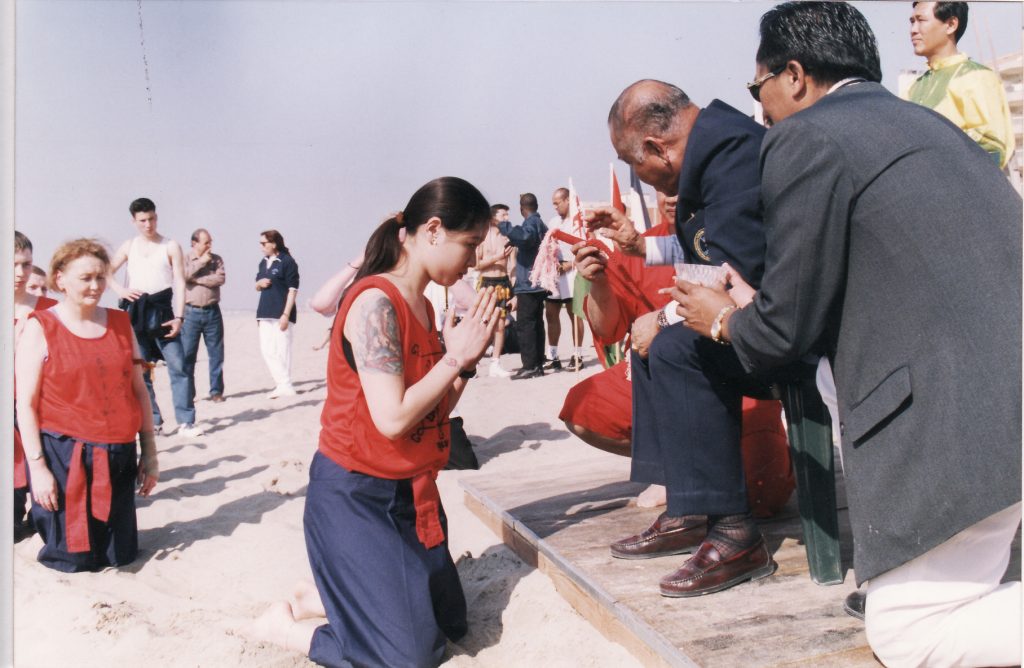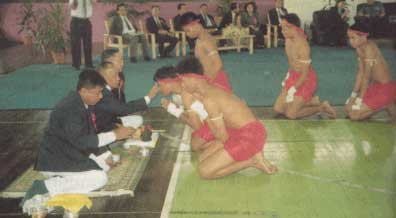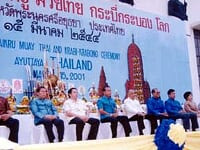
The Official Wai Kru Ceremony Revived
The I.M.T.F with the Office of the National Culture Commission have re-introduced the Official Wai Kru Ceremony for both Muay Thai & Krabi Krabong after years of it being neglected. This neglect came about because of the fragmentation of Muay Thai Groups around the World, many of which did not completely understand the correct procedure to follow and the true meaning of Wai Kru. For, without the Wai Kru Muay Thai would not be the same, and would lack one of the most essential aspects of the Art!The very first Official Wai Kru Ceremony was held in the Janyingyong Gym at the National Stadium in Bangkok during 1994. President of this auspicious Ceremony was General Prem Tinsulanon, a Member of the King’s Privy Council and also a Senior Statesman of Thailand. He was so impressed with this, that he suggested that it should be preserved and organised the same way every year for posterity, for the benefit of all peoples from around the World, who are interested in Traditional Thai Culture & Arts. The I.M.T.F and the Office of the National Culture Commission have now made all the arrangements for this to happen henceforth.
The Path of How to become a Master
The path to becoming a Master of Muay Thai is not as straightforward as one may think! For there is no easy route one can follow in this endeavour. Not even for those who have had the most experience, or even the greatest Champions of the Boxing Ring!The reasons for this are many and varied, but basically we can say that even the best of even the Greatest Champions is not guaranteed to be able to teach what he knows or pass on that invaluable knowledge. Likewise, someone who is a good Teacher in many aspects of the Art may not be able to instil in his Students the ability to become a Champion of the Ring.A Master or even Grand Master of Muay Thai needs to have all these qualities in 1 person, himself, and have many more! In fact, we can say that he must be the embodiment of the Art and live it every day! Some of the qualities he should have are – a full understanding of the History, Traditions and Techniques of Muay Thai & be able to communicate it to all levels of Students. He should be of good character & have respect for himself, others and all of life. He should be willing to totally commit himself to the endeavour of becoming a Master of this Martial Art no matter how long it may take. He should also show the same commitment to his Students!Even if a Teacher has most of the previously mentioned qualities – the experience, skills & knowledge of Muay Thai, or the commitment, this will not necessarily guarantee him of the accolade of Master. For there is 1 last hurdle he must clear, he will require the acceptance & acknowledgement of his abilities from his peers (other Masters). Unlike as in some other Martial Arts over the last few years, where people have reached a certain Level and then Granted themselves dubious Titles, Tradition still plays a very important role in Muay Thai and the candidates for this Title must have the full backing of a Committee of the current Masters as well as Representatives of the Department of Physical Education, Thailand.
Teaching Etiquette, Discipline & Respect
We as Muay Thai Teachers or Instructors have a duty to our students and Society in general to help teach younger generations all the traditional values so that they can contribute to society themselves, as well as teaching them all the pure techniques of Muay Thai. Because of the chance of mishap or accident during the course of learning the Martial Arts like Muay Thai which is a Contact Sport, there is a need for some guidelines, such as self control, discipline & most of all respect are all essential elements of this.Generally speaking, one should not show anger or irritation, or offer blunt criticism. Anger not only breaks all the Rules about avoidance of conflict, but it also causes considerable, possibly irreparable, loss of face to whoever displays it, Criticism similarly smacks of confrontation. Such discourtesy may be met by studied politeness, but this only disguises the cost. Try to remember to stay calm in the face of frustration & difficulty. The Thai people applaud the quality of – ‘Jai Yen’ which literally means ‘Cool Heart’. Coolness coupled with respect and politeness does not represent weakness to Thais, but it is thought of as appropriate behaviour.

The Oath used in the Wai Kru Ceremony
Although there may be some slight differences in the Ceremony with regards to the order of the Rituals and Buddhist prayers that are used, the following are the ones which are most commonly used in the I.M.T.F. During the Wai Kru Ceremony, each of the Trainees will Repeat the ‘Age Old Oath’ in Paying respect to the Masters (and Grand Masters) of Muay Thai.
This is as follows:“Today I pay homage to both bygone and living Muay Thai Masters. U-ga-sa, I invite all Grand masters of Muay Thai, such as –
Kru Gimiseng (Suntorn Taveesit)
Kru Ni-yom Tong-jit
Kru khet Sri-yapai
Kru Sudjai Cha-reon-rat
Kru Bua Ad-im
Kru Poon Pra-gan-chai
Kru Sa-waeng Si-si-bo
Kru Sa-mai me-sa-man
and Kru Sub Un-ta-go-sol’.
‘I swear by this Oath to become their student and sincerely promise to abide by the Rules and Regulations, and give fidelity to my own Teacher. I will conscientiously try to preserve all the knowledge, skills and all the Traditional Rules and Practices which I shall learn’.‘In addition, once I have been trained by my Master, I will preserve the right to take the – pattern learned as my own. I sincerely promise not to be disrespectful to, insult, treat with contempt, nor take revenge on my Master, or students of my Master’.
In Muay Thai, the boxer will always preface the fight with Wai Kru and this tradition is still practised nowadays. This ceremony is usually performed to rousing Thai music from pipes and drums, and with the initial Ram Muay (the boxing movement). The Wai Kru & Ram Muay are useful, since the Boxer gains encouragement from paying homage to his Teachers and feels that he is not on his own: he has his Teacher & the other Teachers of the Muay Thai discipline to support him.The Wai Kru process will also give him time to concentrate & revise what he has learned, as well as display the nature of his weapons and the high degree of his skill. The steps, movements & use of his weapons are designed to warm up the body’s muscles, survey the field of play & conceal the contestant’s style of fighting. When the traditional Sarama music sounds around the ring it is recognised by all who are present as a symbol of deference & respect. Prior to the fight, the music helps to urge the fighter on, and rouses his spirit until he is ready to face his opponent in the boxing ring in manly combat.The accompanying photograph shows a number of the Mongkons placed in a ceremonial vessel ready for the presentation ceremony, with other special objects.The Mongkon (Mangala) is the traditional Thai head band which is worn by Muay Thai exponents while paying respect to their teachers and carrying out the ritual dance prior to the contest. It is usually made from a special cotton yarn which has been bound together in a certain way. The Mongkon is a sacred object which a Master of Muay Thai has previously ceremoniously blessed at a special Teachers Homage Ceremony and can contain Sacred Buddhist items such as a picture and inscriptions. In the past (and sometimes at the present time) they have had a sacred amulet wrapped in them which a monk has said special prayers for. Ancient warriors & fighters used to wear the Mongkons before any bout of combat because they believed it would bring them good luck and enable them to win the fight. This tradition has carried on through, right upto the present time.
The Ceremonial
Following Thai Tradition, the place which has been chosen for the Wai Kru Ceremony should be carefully arranged with Muay Thai Boxing Equipment laid out on each side of the setting. Usually, a statue of the Buddha is placed in a central location as the main focus of attention. White flowers, incense sticks & candles will normally be brought to this place as Ceremonial objects for paying Homage with. Likewise, a white wax candle will also be brought weighing (approx) 15 grammes and a bowl for holding ‘Holy Water’. Some scented blessed powder will also be used during the Ceremony for the Traditional marking of the Boxing equipment. It is also Customary for a metal tray to be brought for donations that will normally be given to the Buddhist monks as a gift on the next day. The Ceremony usually begins as follows the Muay Thai trainees (fighters) will enter the location reverently, bringing with each of them 5 incense sticks, white flowers, a white wax candle and some coins to be donated to the monks. They should then sit down on the floor preferable in the Lotus Position, in neat rows facing their Muay Thai Teacher (Kru), silently thinking about him, and recalling as many different aspects as possible about
him for approx 1 minute duration. The Wai Kru Ceremony proper then begins. All of the trainees should then bend forward & perform 3 prostrations to show respect. They should then resume sitting quietly and still again. Their Teacher will usually at this point in time prepare the ‘Holy Water’, by certain Rituals such as dripping wax from the candle into it. At the same time, he will say prayers in Thai praising all the virtues of the Buddha, Dhamma and Sangha.At this point in time during the Ceremony, all of the lit candles and incense sticks will then be collected and put together in 1 place. After which, all the trainees will usually perform 3 more prostrations towards their Master. Then after kneeling down, sit in the Lotus Position with their hands clasped together at the centre of their chests (palms flat) as in the Traditional ‘Wai’ position. The Teacher will usually lead the trainees in the chanting of Buddhist prayers.While preparing the Ceremonial “Holy Water” it is not unusual for Teachers to drink some of it, sprinkling some onto the crown of the head. After which, he will then usually dip the index finger of his right hand into the container that holds the scented powder made moist by him and dab it onto all of the Muay Thai training equipment.The teacher will also mark the crown of the Trainees heads with the moist powder while saying (chanting) ‘Namo Buddhaya’ which means roughly – a blessing from the Buddha. Following Tradition, normally at this point in time the Trainees may take some of the wax from the ‘Holy Water’ and stick it to their hair. This is meant to be very lucky and is called – ‘To attach or or stick the wax’.

The Thais always hold Wai Kru ceremonies on a Thursday, which is believed to be the Teacher’s day. On that day, pupils present certain offerings, usually flowers, money, cloth, etc to the person who has accepted them as his student. The pupils make a vow that they will study seriously and patiently, respect him and behave fairly to their fellow students and will use the knowledge gained properly, and so on (see the following copy on the next section).In Muay Thai practise, the initial Wai Kru is called – Kheun Kru (the initial Ceremony of Paying Respect to the Teacher). Subsequently, they will pay respect to their Teachers Ceremonially each year, which is called ‘Yohk Kru’. But when ever the pupils intend to use the knowledge taught to them, they will always start by Paying Respect to their Teacher; this action is called Wai Kru or Bucha Kru (to Pay Respect to a Teacher).
The Correct way to ‘Wai’
One of Thailand’s special Customs is the ‘Wai’, it is used on a number of different occasions. Such as – a greeting when meeting people like other Muay Thai practitioners or students, people you train with or Thai people. It can also be used as a way to say farewell or good bye to them. This is also done by saying – Sawasdee Krab (with your palms joined & placed in a position lightly between the chest & fore head, head bowed slightly). Besides that, the Wai can be used to apologize or to say sorry, by also saying Khotode. In Thailand (and other places where its people have moved to) it is a significant Social Custom which reinforces both the Social structure and religious dogma. It is a statement of a persons rank in the Social hierarchy. Who ‘Wais’ whom first & exactly how, are all part of the dictates of the way to Wai. For instance, generally speaking, a younger person Wais an older person first, a Social inferior Wais a superior first. A monk will never Wai a layman. It is very important, that all Kru MuayThai should remember to stress the importance of the Wai to their trainees during Muay Thai Classes. Any trainees who may seem to forget this Traditional Custom should be firmly reminded of it !! Furthermore, Kru MuayThai should try to set a good example to their trainees in this at all times, and whenever it is possible.
WAI KRU (With regard to – Paying homage to the Masters of Muay Thai)
‘Kru’ is a Thai word which means the person who teaches ‘sit’, or passes on knowledge to pupils (sid). Normally Krus are highly respected in Thai Society. They are knowledge able, full of perseverance. They practice high moral standards in their way of life, leading very respectable lives. They always devote themselves to performing their teaching commitment until their pupils attain full knowledge and are successful in their fields. Such a Kru is usually rewarded by his sense of achievement, respect from everyone and an increase in the number of students willing to submit to his guidance.To show sincere appreciation and perseverance, dedication and generosity in conferring knowledge & providing experience for good opportunities, pupils in return will submit themselves obediently and respectfully to their own Teacher’s instruction and advice, serve him diligently, and obey the rules and regulations laid down by him (or her), so that the Teacher can pass on the knowledge of that particular field to them closely, quickly, properly and wisely.
Wai Kru is a demonstration of the pupil’s respect & gratitude to his teacher in submission to the teaching & training. Wai Kru is traditionally practised by Thais of various professions & Arts, e.g dancers, sword fighters, musicians, as well as academic students, and of course Muay Thai Boxers are no exception. As we have previously stated, “Wai” means to pay respect by putting both hands together in front of the chest. The demonstration of Wai Kru does not only imply paying respect to the present Teacher, but also includes homage to all the teachers of the discipline.
